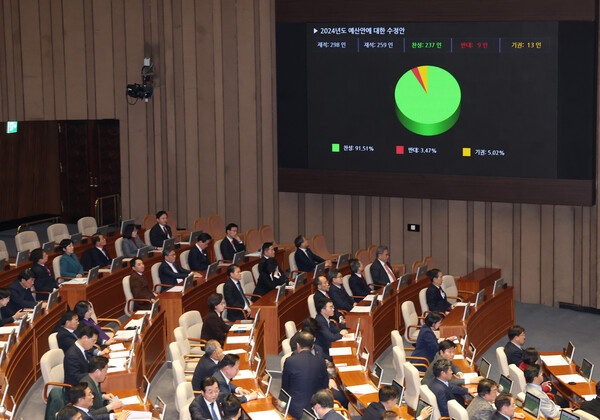National Assembly approves historic 15% cut to R&D budget
By Moon Joon-hyunPublished : Dec. 22, 2023 - 15:49

The South Korean National Assembly concluded a contentious decision to reduce the national research and development budget to 26.5 trillion won ($20.4 billion) on Thursday, a 15 percent reduction from this year and marking the first R&D budget cut in 33 years.
The reduction of 4.6 trillion won is a slight adjustment from the government's initial proposal of a 5.2 trillion won cut, a concession in response to significant backlash and criticism from both the scientific and political communities.
The budget cuts followed President Yoon Suk Yeol's call for a fundamental reassessment of R&D strategies during a fiscal strategy meeting in June. His directive led to the ministry embarking on significant budget reductions in the name of R&D innovation, even missing the deadline for submitting the national R&D budget proposal for the first time.
Facing strong opposition from the scientific community and opposition parties, Yoon responded by committing to an increase in R&D spending during his tenure.
In response to concerns about employment stability in research sectors, the government has earmarked specific funds. Of the 600 billion won increase over the initial proposal, 52.3 billion won will address job security for researchers.
A notable 178.2 billion won is allocated to support personnel costs in postcompletion corporate R&D funding projects. These projects, which undergo postcompletion assessments, can secure continued funding for research personnel through low-interest loans, potentially benefiting around 16,000 researchers.
The budget also includes 45 billion won for new projects involving 1,200 postdoctoral researchers, alongside 10 billion won to expand scholarships and grants for 1,000 graduate students.
Additionally, basic research projects receive a boost of 152.8 billion won, and the contribution to personnel costs at research institutes, which rely heavily on project-based funding models, sees an increase of 38.8 billion won over the government's initial proposal. Research institutes primarily receive funding for specific projects rather than a steady flow of general labor expenses under these models.
Advanced technologies such as lunar exploration, 6G communication, and Korea's Urban Air Mobility initiatives are set to receive an additional 18.8 billion won. Nuclear power plant research, a key focus under Yoon's administration for enhancing safety and component competitiveness, receives an extra 14.8 billion won.
The budget for the Ministry of Science and ICT in 2024 was finalized at 18.56 trillion won, marking a 1.6 percent decrease from the current year's budget.






![[Weekender] How DDP emerged as an icon of Seoul](http://res.heraldm.com/phpwas/restmb_idxmake.php?idx=644&simg=/content/image/2024/04/25/20240425050915_0.jpg&u=)
![[Herald Interview] Guggenheim Museum makes a push for technology-based art with LG](http://res.heraldm.com/phpwas/restmb_idxmake.php?idx=644&simg=/content/image/2024/04/26/20240426050608_0.jpg&u=20240428114717)




![[Music in drama] An ode to childhood trauma](http://res.heraldm.com/phpwas/restmb_idxmake.php?idx=644&simg=/content/image/2024/04/25/20240425050929_0.jpg&u=)






![[Herald Interview] Mistakes turn into blessings in street performance, director says](http://res.heraldm.com/phpwas/restmb_idxmake.php?idx=652&simg=/content/image/2024/04/28/20240428050150_0.jpg&u=20240428174656)
